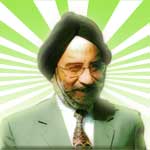The Charlottesville Democratic Committee (CDC) has woven a tangled web in its decades old “secret” representation agreement with the city’s black community, and now their chickens are coming home to roost.
The “deal,” cemented in the early 1980s was reached after the Charlottesville NAACP and affiliated individuals nearly succeeded in pressuring then-Mayor Frank Buck and his Democrat council majority (who unanimously opposed a change) to move city elections from the at large method to a ward or district system. At large election schemes had been used for years in the South (including in Charlottesville) by white Democrats seeking to dilute or disenfranchise the black vote. During the 1960s and 1970s, many jurisdictions (e.g. Richmond, Petersburg) were forcibly compelled by the United States Justice Department to convert from at large to ward-based elections, but through a series of manipulations and dodgings Charlottesville narrowly avoided Department of Justice scrutiny and appurtenant mandated election reforms.
A compromise was reached then—in private response to ongoing public pressure—as Charlottesville Democrats clandestinely agreed to designate in perpetuity, a single council seat on the five-member board as the “black” seat. After a series of Democrat-backed payouts and buy-offs, the CDC gained agreement from influential NAACP members (fracturing that organization) that such designation was acceptable and roughly proportionate to Charlottesville’s black population, then approximately 20%.
This “system of patronage” effectively has quashed independent black candidacies in Charlottesville, which for years had been a threat to the election of establishment Democrats. Since 1984, there have been no black independent candidates for Charlottesville City Council. Since 1980, there has been one, and only one black face on council at any given time, a statistically improbable (if not impossible) chain of succession. Charlottesville Democrats—who tightly control the nomination and election process—never have nominated a 2nd black person during an interim election, while a designated black “representative” currently was serving: this because white Charlottesville Democrats fear a black “voting bloc” on council.
Over the years, the designated black councilors served at the pleasure of the Charlottesville Democrat Committee, which often told the designee exactly how to vote on specific issues of importance. The willingness to “take instruction” was (and is) an essential prerequisite for any black person who accepted the Democrats’ invitation to elected office.
It has become increasingly difficult for Charlottesville Democrats to find willing black accomplices to further their racial manipulation scheme, as black participation in the CDC is historically low. The last two “minority” representatives on Charlottesville City Council, Kendra Hamilton (2004-2008) and Holly Edwards (2008-2012), have served only a single four-year term (their predecessors each served two consecutive terms), causing a premature and frenzied search for a suitably compliant black replacement.
In the 2011 election cycle, the CDC was taken aback by Edwards’ decision to forgo certainly guaranteed re-election. While her service has been more independent than that of her predecessors, Central Party Democrats were willing to tolerate autonomy somewhat in exchange for eschewing the arduous task of replacement.
Enter Satyendra Huja, current city councilor, consummate Democrat insider, of “minority” (i.e. Indian) descent, and recently announced to be seeking re-election. Behind-the-scenes CDC brainstorming led to an inspired, if not totally palatable solution for the paucity of potential black candidates to fill Edwards’ seat: Huja can be the “black” candidate! This arrangement, of course, would involve creative interpretation of the original “agreement”; but memories are short, and many years (and people) have passed since its inception.
Charlottesville Central Party Democrats know Huja’s candidacy as the faux black council designee would be a stretch in addition to a hard sell. And they rightfully fear an uprising if the 20% “agreement” is breached. While Huja remains the CDC’s fall(back) guy, they continue to beat the bushes for an authentic black face to hold the seat for the next quadrennial. With most of the “usual suspects” (i.e. David Simmons, Karen Waters, etc.) exhausted or disqualified from consideration, attention has turned to the Charlottesville School Board—a Democrat breeding ground for potential Charlottesville City Councilors.
The seemingly obvious choice, School Board Chair Leah Puryear, is too capricious for serious consideration, but Colette Blount, whose profile has been raised recently in local Democrat circles through key appearances and recognitions, is perfect. Polite, non-threatening, and professional, Blount possesses prime qualities sought by Democrats for their designated “minority” seat warmer. Whether Blount will capitulate to the CDC’s invitation (and behind the scenes arm-twisting) is unknown. But unique circumstances and the high stakes at hand make Blount’s rumored candidacy for Charlottesville City Council a good bet—and in the absence of another willing, black Democrat “mark”, Councilor Colette is a near sure thing.
(Satyendra Huja photo courtesy of Charlottesville Tomorrow.)










“School Board Chair Leah Puryear, is too capricious for serious consideration, but Colette Blount, whose profile has been raised recently in local Democrat circles through key appearances and recognitions, is perfect. Polite, non-threatening, and professional, Blount possesses prime qualities sought by Democrats for their designated “minority” seat warmer. Whether Blount will capitulate to the CDC’s invitation (and behind the scenes arm-twisting) is unknown.”
Sounds like the local Democrats’ days of using the city school board as an incubataor for political correctness and candidates is diminishing. After all these years, one has to wonder if the individuals in this special interest succession have woke-up to being so manipulatively used.
Sad but the democrats don’t care about the citizens or the city. All they want to do is stay in power. It is just a big game to them.
I’d love to know if this deal actually occurred. Perhaps it did, but there is no evidence for it here, and coming from a source so consistently cynical about Democrats but never about conservatives, the story can’t be accepted at face value. Cville could really use a conservative critic who tries to be fair – that would be one we could trust.
Downing Smith writes:
Sad but the democrats don’t care about the citizens or the city. All they want to do is stay in power. It is just a big game to them.
Right, of course. And you know that because . . . ? Hint: if everything Rob says here is true, that still doesn’t begin to support your point. But never mind, you don’t have to provide actual evidence for your charge, any more than Rob does for his. Every conservative “knows” your charge is accurate. It’s an article of faith – mindless, uncharitable faith.
Are there any conservatives out there who still think for themselves and don’t just spout the predictable party line? Yes, but you call them RINOs.
Rob, How does former Mayor Maurice Cox fit into your formula? He, at least, gave the appearance of a loose
cannon free of Central Party Democrats control. He seemed
to have his own agenda which I would argue was financial
in nature. This would involve the architectural projects
promoted in the city. Regarding the fall back position
with a Huja reelection bid, the South African government
did refer to citizens of Indian ancestry as “colored”.
In an American context that language might work. For
Charlottesville, citizens may need to explore lessons
in implementing political change in a one-party system.
There must be some information and human resources in a
university town about attempting to do this in a one-
party context. Democrats for CHUMP change didn’t really
change this dynamic.
Gary, Maurice Cox used his position on Council to make money. He represented the black church on W. Main in a request to grant a demolition permit for a building on W. ain beside it and his wife was hired to work on the old Woolworth building when it was having being approved by the BAR. Are you supporting the idea of the Democratic Party’s policy of the “obligatory black” on Council , by bringing up Cox? I doubt but notice there are no blacks on the Planning Commission.
Gary,
A good example of Maurice Cox’s subservience to the “machine” was then candidate Cox’s 1996 front page Daily Progress story in which he favored electoral reform, specifically a ward system for Charlottesville. A few years later, when as a councilor I pushed for electoral reform, Cox, doing the bidding of his Democrat “masters” fought my efforts to establish district-based elections in Charlottesville. In fact, when confronted with the 1996 Progress story, Cox claimed he did not remember the story or having taken a pro-ward position. Hmmmm…
OK, Rob, I’ll take your word for it that the deal went down. Now I challenge you to give evidence that 30 years on, with none of those Democrats who forced the deal still in power, today’s Democrats are still trying to enforce it. And with what leverage?
Ken,
Actually, some of the same are still in power behind the scenes. The evidence I have was a phone call during my term in office from the “black” councilor, telling me that arm-twisting was taking place regarding an upcoming vote, and the arm twister was Mary Ann Elwood, who was doing the same back in the 80s (see my previous story for documentation). That councilor ended up changing a previously stated public position in order to accommodate the Party and was disgusted and embarrassed in having to do so.
Rob, thanks for the reply.
The purported evidence of a deal comes from an anonymous “Mr. Johnson,” not from an individual willing to go on record. Because Johnson can’t be questioned by anyone else, the truth of his story can’t be assessed.
The deal Johnson was supposedly offered was that he’d be nominated for council if he agreed to vote along with the Democratic leadership, and the charge is that this was racist. But of course the terms of the deal are standard practice for all parties, the Tea Party included, regardless of the race of the individual. No party and no organization supports someone who will likely vote against it. Likewise, the charge that Democrats want to “manipulate the outcomes of at large Council elections” is a charge that Democrats try to win elections. Heavens, what will they stoop to next?! :-)
Likewise, Mr. Repass is obviously correct that most working class, lower-income people don’t have the time to take on council duties. Nor do they, by and large, have the depth of knowledge and expertise to do it as well as professionals.
As for the 1981 and 1982 referendums, I agree that the action should have been taken based on the 1981 referendum. But the charge that Democrats left the question off their ballots so that the result wouldn’t count makes no sense given the fact that these same Democrats then asked for a second referendum. Clearly there was a power struggle going on among the city’s leaders, both black and white. That it was based on race is not clear. From what you alleged and what you documented in that link, if anything, it was more likely based on class.
[…] not receive the “buy local art” memo. An internal coterie, spearheaded by Democrat Councilor Satyendra Huja, currently is conspiring to drop valuable tax dollars on an expensive piece of “non-native” […]
[…] Blount, assumed successor to the “black crown” on Charlottesville’s all Democrat and historically white City Council, […]
[…] Satyendra Huja, a long-time city employee and one-term council member parked in a clearly designated handicapped area in front of Burley Middle School during last Wednesday’s political event. An eyewitness video (see below) shows Huja’s black Mercedes C320 (license: WAHGURU) blocking a curb-cutout ramp meant to provide access to the school for disabled persons parked in adjacent marked handicapped spaces. The particular spot Huja occupied was conspicuously marked to prohibit any parking. [story continues below] […]